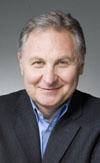|
|

|
Infertility: Not just a woman’s problem
|
by Maggie Diebolt
Public Relations
Couples wanting to have a child, but who are struggling with
infertility, may find answers to “why not” scenarios and solutions
through infertility expert Harry Fisch, M.D.
 Dr. Harry Fisch Dr. Harry Fisch
As the only male infertility specialist in South Carolina, Fisch brings
new hope to couples throughout the state. Having successfully treated
thousands of men with sexual and fertility problems through his New
York practice, Fisch will be available to MUSC patients several days
each month through MUSC's Department of Urology. Fisch began meeting with patients
Jan. 29 in Mount Pleasant through the MUSC Male Infertility Program.
Infertility is a common condition affecting approximately 10 percent to
15 percent of couples. While most infertility problems have been blamed
on women, male infertility actually is the cause of 40 percent of such
cases, Fisch said.
Male infertility can be linked to sperm production, transportation
through the male reproductive tract, and delivery into the female
reproductive tract. Female infertility may be caused by a lack of
ovulation, blocked fallopian tubes, or inability of an embryo to
implant and establish pregnancy in the uterus. Most often, infertility
is the result of a combination of several problems on both the male and
female sides, Fisch explained.
As one of the nation’s leaders in the diagnosis and treatment of men’s
health, male infertility and microsurgical vasectomy reversal, Fisch
was attracted to the field of medicine through his love for problem
solving. Now, he devotes himself to helping his patients improve their
health and fertility. “Whatever the unique issues that a
couple has, the end result of helping couples realize their dream of
becoming parents is the most rewarding and gratifying job I can think
of,” Fisch said.
While he still will be based in New York, Fisch was attracted to expand
practice in Charleston for several reasons: “Charleston is beautiful,
pure and simple,” he said. “But what’s more amazing than the locale is
that the people are warm, friendly and gracious. Throw in a world class
medical center, fantastic doctors and staff—you can’t top that,” he
added.
With expertise in reversing vasectomies, Fisch aims to establish a
world-class fertility center for men in the Southeast. “Treating men to
increase fertility can be the easiest approach for couples to
achieve pregnancy,” he said. “Through vasectomy reversals, many
men will have the chance they deserve to restore their fertility.”
Fisch is the author of two books on men’s health and fertility,
including “Size Matters: The Hard Facts about Male Sexuality that Every
Woman Should Know,” and “The Male Biological Clock: The Startling News
About Aging, Sexuality, and Fertility in Men.” Fisch’s work has been
cited in USA Today, The New York Times and The Washington Post. He has
appeared on television’s 60 Minutes, 20/20, CNN and Today, among other
news programs. When he’s not in Charleston, Fisch serves as director of
the Male Reproductive Center, director of urologic microsurgery at
Columbia University Medical Center of New York Presbyterian Hospital,
and is professor of clinical urology at Columbia University.
In addition to treating patients experiencing impotence and infertility
issues, experts within MUSC’s Department of Urology offer consultation,
diagnosis, and treatment for male and female patients of all ages who
are experiencing such illnesses as prostate cancer, bladder cancer,
adrenal cancer, kidney disease and stones, testicular cancer, female
and pediatric urological conditions, urinary tract infections,
incontinence and bladder dysfunction.
For information, visit http://www.harryfisch.com, http://www.usvasectomyreversal.com, or call (800) 375-0518. For more information on the Department of Urology visit http://www.muschealth.com/urology/.
Friday, Jan. 30, 2009
|
|
|



